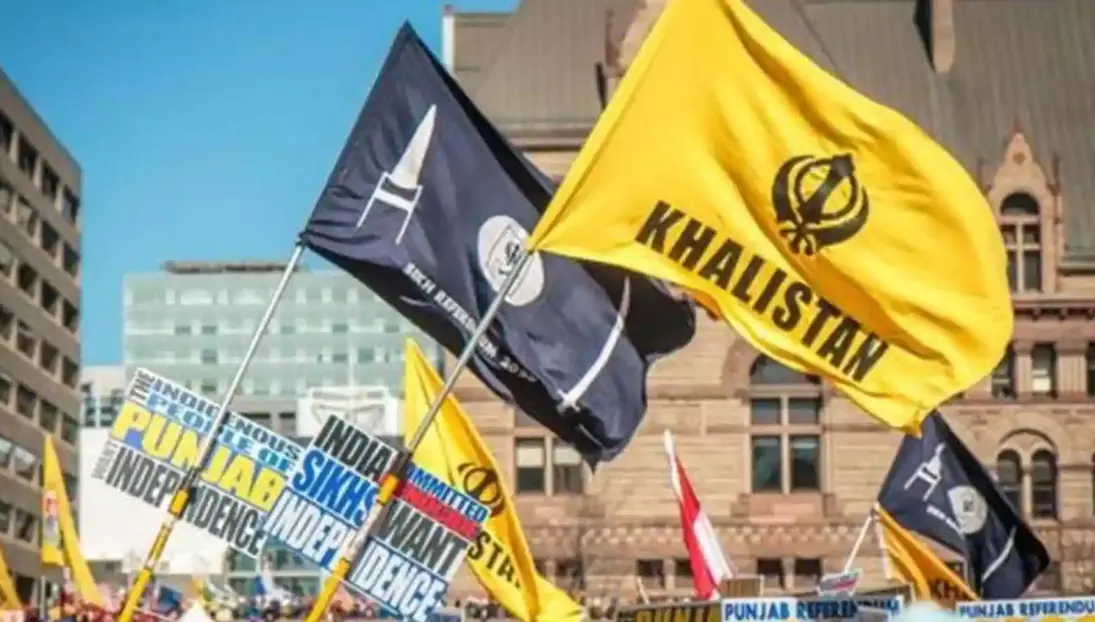Shedding complacency
The rise in concerted activities by Khalistani groups in the US, Canada and Australia, with an apparent support from the ISI, calls for a strict approach

Contrary to apprehensions that on July 8, Sikh separatists would organize an anti-India rally in Toronto, they failed to mobilize any popular support and their plans ended up as a damp squib. This outcome was mainly due to a large section of the anti-Khalistani and pro-India diaspora in Canada, who came out in significant numbers, neutralizing the radicals' efforts. It may be recapitulated that the Sikh ultras had called for a rally in Toronto to protest and avenge the killing of Hardeep Singh Nijjar, who was shot dead on June 18 in Surrey, Canada.
Earlier, the eruption of violent activities perpetrated by the Khalistanis had made headlines, though signs of such disturbances had been anticipated for some time. Countries like Canada and the US, which claim to be technologically advanced and possess adequate intelligence and security machinery, failed to take preventive steps to stop the violent activities targeting Indian Consulates.
A shameful incident occurred on July 2 when the Indian Consulate in San Francisco was set ablaze by vandals supporting the Khalistan cause and seeking revenge for the alleged killing of Nijjar. Canada also witnessed a series of posters circulated by the Khalistanis, carrying anti-India messages and threats to the lives of India's High Commissioner in Canada and its Consul General in Toronto. Authoritative academics believe that Canada's handling of the Khalistani problem has fallen far below the desired expectations. The 1985 Air India Kanishka crash, caused by the Khalistanis, and the subsequent acquittal of the mastermind of the mid-air explosion, speak volumes about Canada's lack of resolve in containing terror.
Canada, under a politically naïve Prime Minister and devoid of any political or diplomatic statecraft, seems to lack the will to control terror or even handle the Khalistani activities on Canadian soil effectively. Its intelligence apparatus appears to be dormant, as intelligence sources report that inputs received from their Indian counterparts have gone unheeded.
As the situation appears to be spiraling out of hand, it becomes imperative for Indian agencies to seriously consider using diplomatic initiatives to maintain an armed posse of Indian contingent in potentially vulnerable diplomatic missions/consulates for their safety and security. Additionally, there should be more vigorous exchanges of hard and preventive intelligence with host countries, and Indian diplomatic missions must ensure that these insights are acted upon. Furthermore, India should contemplate implementing a quid pro quo action for the Canadian, Australian, and US missions in India, ensuring the safety of Indian personnel and officers from violent assaults.
Amidst these happenings, one must not forget the role of the Pakistani Inter-Services Intelligence (ISI), which has clearly resumed its proactive, anti-India, and pro-Khalistani designs. These activities need to be operationally neutralized to thwart their nefarious plans of promoting Khalistan-linked terrorism targeting Indian facilities abroad and in the state of Punjab.
According to a recent report, in a larger conspiracy against India, Khalistani terrorists have now established an operational base in Portugal. Additionally, the ISI has recently facilitated a consignment of illegal weapons from Portugal to active criminals in Punjab. The syndicate came to light after the arrest of a Khalistani terrorist from Punjab's Firozpur in Portugal. The individual was found to be in possession of a cache of lethal weapons, including an AK-47, MP-5 submachine gun, hand grenades, and a pistol. It was alleged that the ISI had assigned him the responsibility of delivering these weapons to active criminals in Punjab.
Meanwhile, Indian diplomats in Australia have also received threat calls from Sikh extremists in Sydney and Melbourne. A poster circulating on social media by extremist elements carries photos of Indian diplomats, calling for avenging the death of Nijjar. This pattern indicates a clear collaboration among Khalistani activists apparently working in unison in Canada, the US, and Australia. Knowledgeable sources attribute such concerted action, combining propaganda and violence, to the support of an intelligence agency like the ISI, whose role in abetting the Khalistani concept and their wanton killings in the 1980s is well known in the public domain.
A flurry of diplomatic activities between India, Canada, and other countries is being noticed, with demarches and protests being made. However, these actions are merely diplomatic niceties. Canada, in particular, should be seen as taking more concrete measures to contain terror and prevent anti-India rallies.
Meanwhile, fresh inputs, yet to be confirmed, indicate that some Canadians are now demanding a separate state in parts of Canada, including Surrey, Brampton, Mississauga, and Malton. There are speculations that these extremists may be contemplating the disintegration of Canada, although this concept may still be at a nascent stage. In such a scenario, even Alberta and Quebec could be under possible threat and fraught with the perils of a breakup.
The writer is an IPS officer, Adviser NatStrat, security analyst and a former National Security Advisor in Mauritius. Views expressed are personal



